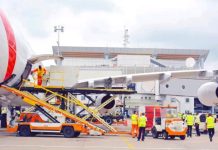Festus Keyamo, the Minister of Aviation and Aerospace Development, has attributed the frequent flight cancellations and high ticket prices for both local and international flights in Nigeria to a shortage of aircraft.
In an interview with BBC Pidgin on Saturday, Keyamo expressed concern over the challenges facing the aviation sector, including sudden flight delays without prior notice to passengers, but assured the public that these issues would soon be addressed.
Keyamo revealed that the government has initiated steps to empower Nigerian airline operators by facilitating partnerships with foreign airplane manufacturers. He highlighted that airline operators face significant financial strain due to high rental costs for aircraft, a process known as wet leasing.
“The airline operators explained to me that the costs of hiring planes are too high,” Keyamo said. “The aircraft they bring to Nigeria cannot be paid for in installments because those leasing the planes are afraid of Nigeria. They believe the country has a reputation for dishonesty, and if operators here can’t pay, they fear they won’t be able to reclaim their planes.”
Keyamo further stated that after meetings with aviation stakeholders globally, they suggested amending the Cape Town Convention law to protect foreign lessors. The law, once signed, ensures that if a plane is brought to Nigeria and there is a default, the government will allow the lessor to reclaim their aircraft.
Since the signing of the Cape Town Convention, Keyamo noted that Nigeria’s aviation rating has seen a significant improvement, rising from 49 percent to 70.5 percent. He expressed optimism that as more aircraft become accessible, ticket prices will begin to decrease.
On September 12, the federal government signed the Cape Town Convention (CTC) practice direction, enabling domestic airline operators to access aircraft on dry lease. The Cape Town accord seeks to promote asset-based financing and leasing of aviation equipment, including aircraft, expanding funding opportunities and reducing operational costs for airlines.
This agreement is expected to allow Nigerian airline operators to lease aircraft on more favorable terms, which could eventually result in lower flight prices for passengers.













